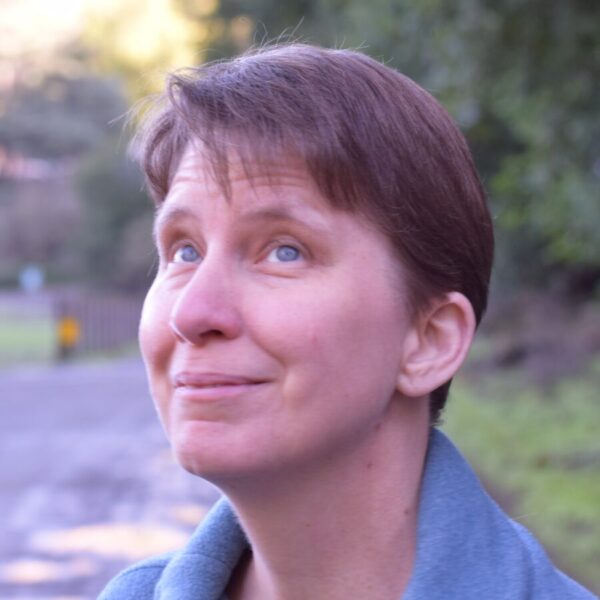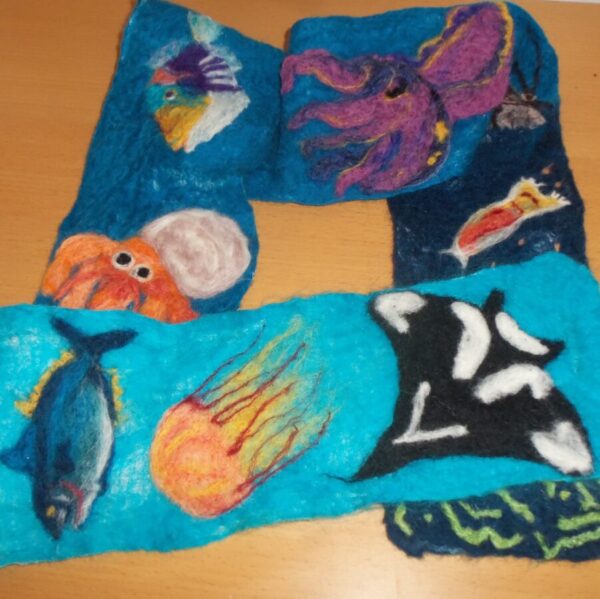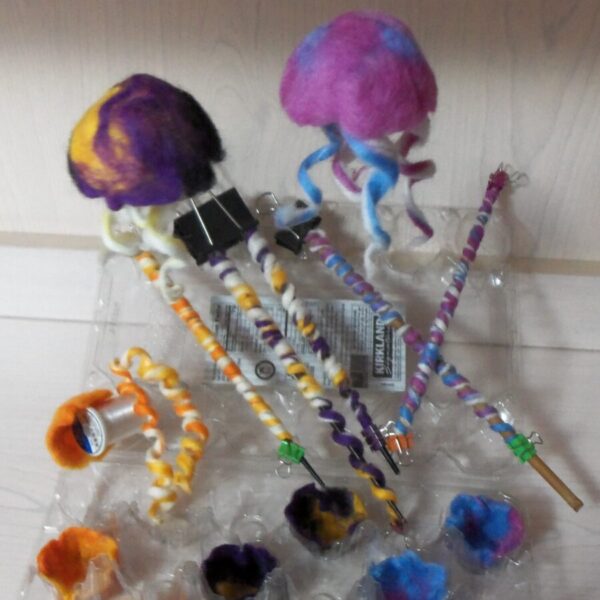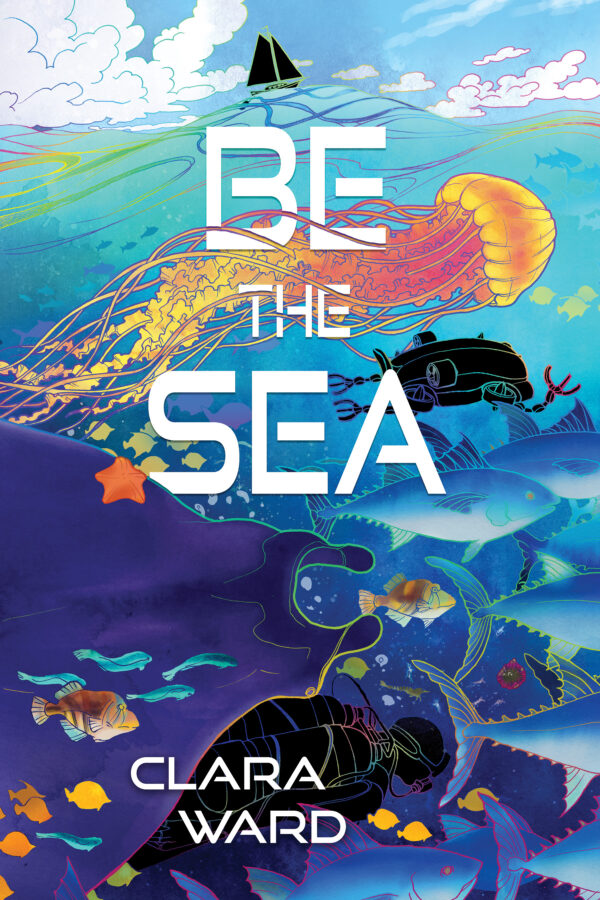
Welcome to my weekly Author Spotlight. I’ve asked a bunch of my author friends to answer a set of interview questions, and to share their latest work.
Today: Clara Ward lives in Silicon Valley on the border between reality and speculative fiction. When not using words to teach or tell stories, Clara uses wood, fiber, and glass to make practical or completely impractical objects.
Their latest novel, Be the Sea, features a near-future ocean voyage, chosen family, and sea creature perspectives, while delving into our oceans, our selves, and how all futures intertwine.
Their short fiction has appeared in Strange Horizons, Decoded Pride, Tales & Feathers, and The Neurodiversiverse: Alien Encounters. Previous novels are available in both paper and ebook editions. More of their words along with crafted creations can be found at: https://clarawardauthor.wordpress.com
Thanks so much, Clara, for joining me!
J. Scott Coatsworth: When did you know you wanted to write, and when did you discover that you were good at it?
Clara Ward: I always thought in stories. I wrote my first novel at age thirteen. It took me a week of typing almost full time (after three months of planning, mostly in my geometry class). To myself, I said, “Wow, that’s how my brain works.” Then I didn’t show that novel to anyone except my mom and best friend until I’d completed three more novels and revised that first one. By then I was a wise old fifteen-year-old. I realized most people didn’t like the same books I did and wouldn’t appreciate my writing, so I never expected to be good at it. My goal was to be me at it.
JSC: If you could tell your younger writing self anything, what would it be?
CRW: First, I’d want to tell younger me that there would be words in the future for the parts of myself I could barely explain. Then I’d tell myself that it was worth working out my own words and definitions anyway. Much as I loved the word “nonbinary” the first time I heard it in the early 2000s, the future I’d written in my first novel would have been fundamentally altered if I’d had that word in the 1980s. And that’s not the only identity word that might have severely split my timelines. At this point, I’m glad I dug as deep as I did to understand myself and, by extension and through my stories, others. (But it would be hard not to offer some hope and comfort to younger me besides—time travel!)
JSC: Do you reward yourself for writing, or punish yourself for failing to do so? How?
CRW: I’m a very nice boss. Sometimes I reward myself for sitting down at my computer. Writing fiction is one of my favorite things to do once I’m there, so that rarely requires a reward. However, if I write a scene with tasty food (especially chocolate), I think it’s only fair to offer myself a treat afterward!
JSC: Do your books spring to life from a character first or an idea?
CRW: Most stories start with a character nagging me to listen to them, begging me to pay attention, or demanding that I write this down! Often a character brings along an idea or project, but that may be a tiny part of what ends up in the story. For example, the titular character Eve in my story “One Familiar Eve” mostly wanted me to admire her frog and rainbow screensaver.
JSC: What were your goals and intentions in Be the Sea, and how well do you feel you achieved them?
CRW: Be the Sea became so much more than I originally intended. I started out with Wend, a marine scientist dreaming they were a cuttlefish. I hoped readers would care more about the ocean after seeing it through Wend’s eyes (and dreamy sea creature perspectives!). I ended up writing not one but two chosen families, confronting multiple mysteries, and projecting climate and ecosystem changes fifteen years into the future. Along the way, I felt varying levels of connection to the people Wend wanted to spend time with. Then an early reader said, “You realize nearly everyone in this book is queer?” I could only nod and point out that several were neurodivergent, too. Still, I was surprised how many readers saw themselves in Wend’s chosen family and incredibly pleased that all those readers found their way to my book.
JSC: Who did your cover, and what was the design process like?
CRW: Matthew Spencer . He not only became my favorite artist but my favorite art teacher. First, you need to understand that I couldn’t even sketch the ideas in my head. I shared links to some covers I liked along with way too many words about what I thought might work as a cover for Be the Sea. I think we went through three different rounds of thumbnail sketches, where honestly, I would have readily accepted any of them. But whatever words I sent back (about liking all the creatures swimming in the same direction or seeing humans and human tech as shadow figures, etc.), Matthew ran with it and made it even better. Along the way, I learned a lot about colors (especially watercolors), fonts, outlines, and how humans respond to all of that together on book covers. I also ended up with a better cover than my word-filled brain could ever have imagined.
JSC: What other artistic pursuits (it any) do you indulge in apart from writing?
CRW: I enjoy making things by hand, especially when random bits and pieces combine into something unexpected. Lately, I’m intrigued by felting. That means I take bits of dyed wool roving and either squish them in soapy water or stab them repeated with needles until the natural scales in the wool bind together. I’ve made scarves, capes, and vests but also dragons, birds, and so many felted sea creatures!


JSC: What’s your drink of choice?
CRW: Hot chocolate!
JSC: Where do you like to write?
CRW: Wherever the hot chocolate is! More seriously, I’ve taken over a corner of what used to be my kid’s bedroom (along with what used to be my kid’s desk). The room already had sea creature curtains that I made a couple decades before and a huge bookshelf, which I only partially rearranged. I surrounded myself with art and handmade crafts that remind me of all the creativity and creative people in my life. This provides me with a six-by-six space that’s comfortable, fairly quiet, and well lit. I’ve claimed it as my own and made it into a safe space to write, craft, and create.
JSC: What are you working on now, and what’s coming out next? Tell us about it!
CRW: I’ve been challenged to write a novella, and I’m developing a story idea that might turn out that length. It involves another scientist with a cephalopod connection. This one lives at least a hundred years in our future and works in a literal ivory tower—isolated due to sea level rise. Among other challenges, I suspect acquiring chocolate in that world will be extremely difficult.

And now for Clara’s book: Be the Sea:
In November 2039, marine scientist Wend Taylor heaves themself aboard a zero-emissions boat skippered by elusive nature photographer Viola Yang. Guided by instinct, ocean dreams, and a shared birthday in 1972, they barter stories for passage across the Pacific. Aljon, Viola’s younger cousin, keeps a watchful eye and an innovative galley. Story by story, the trio rethink secrets, flying dreams, and how they experience their own minds.
When they reach Hawaiʻi and prepare to part ways, opportunity and mystery pull them closer together. Both scientific and personal discoveries take shape as they join with ex-lovers, lost friends, and found family. Wend must navigate an ever-shifting future, complicated by bioengineered microbes and a plot to silence scientists, entangled with inexplicable dreams and a calling to Be the Sea.
Author Clara Ward is donating 100% of their royalties to conservation efforts for our global ocean.
Publisher | Universal Buy Link
Excerpt
The water pulsed, dim but clear. The high cliffs enclosing La Baie des Vierges blanketed the seafloor in early morning shadows, while the rocking of meter-high swells comforted Wend. The press of warm water through their scuba gear meant safety. The drag of the
air tanks, sample bot, and drybag on their back kept them grounded even while swimming through unfamiliar ocean.
A shining school of fish changed direction to swim alongside Wend. Their yellow-green backs and white bellies brightened the underwater world, making Wend smile behind their full-face mask. Only when the small fish turned and dove en masse, did Wend rise closer to the surface to reorient.
Five sailboats remained at anchor in La Baie des Vierges in November of 2039. Despite ten centimeters of sea level rise, looming rock features and tall palms still dominated the bay, viscerally reminding Wend of pictures posted decades before.
There it was. The reason Wend slipped uninvited through unknown ocean, now of all times. The purple hydro turbine on the double-ended cutter pierced the clear water, a bright human-made shape, easy to spot below the surface. Nuovo Mar gleamed in a coordinated violet script at the stern. Since no ladder hung over the Nuovo Mar’s signature purple rubbing strip, Wend timed their approach to swim up with a swell and
throw an arm high to grab a metal stanchion.
Their shoulder yanked hard. They used the momentum and all the core strength they still possessed to kick one finned foot onto deck. The fin tip smacked hard and missed a solar panel by inches. Wend grimaced but carried on.
Rolling onto a boat’s deck was never graceful or quiet, but Wend made it on the first try, which was as much of a success as they could ask from the day.
“Dites-moi qui vous etes!” The stocky figure shouted something that was clearly not a request and brandished a knife while holding something unidentifiable in the other hand.
“Dites-moi pourquoi la vie est belle.” Wend raised both hands and spit out their regulator as they responded impulsively, brain pattern-matching faster than it could decode a language Wend barely spoke.
“Tang ina!” The knife stabbed forward a couple inches, but with questionable intent.
Wend had no idea what that phrase meant but guessed it was a swear in some language other than French. “Hello? Hola? Ciao? Sawatdee?”
A taller figure rose from the shiny white cockpit into a slant of sunlight and responded in English, voice gruff but clear, “He doesn’t care why life is beautiful or how this ocean features in some old musical you’re quoting. But who you are seems like a fair question. Climbing aboard the wrong boat near dawn is a strange walk of shame.”
Wend pushed up to sitting. The deck was well equipped for an older sailboat, with two solar panels braced on the foredeck and two more clamped to railings. Feeling exposed all of a sudden, Wend took a deep breath. They leaned against their air tanks and all their earthly possessions strapped to their back, as they stared in between the two backlit figures. Wend carefully displayed both empty hands before disengaging their scuba mask and raising it onto their bristly short hair. “Are you Viola Yang? I’d like to join your crew.”
Only bird cries and lapping waves interrupted a long silence.
